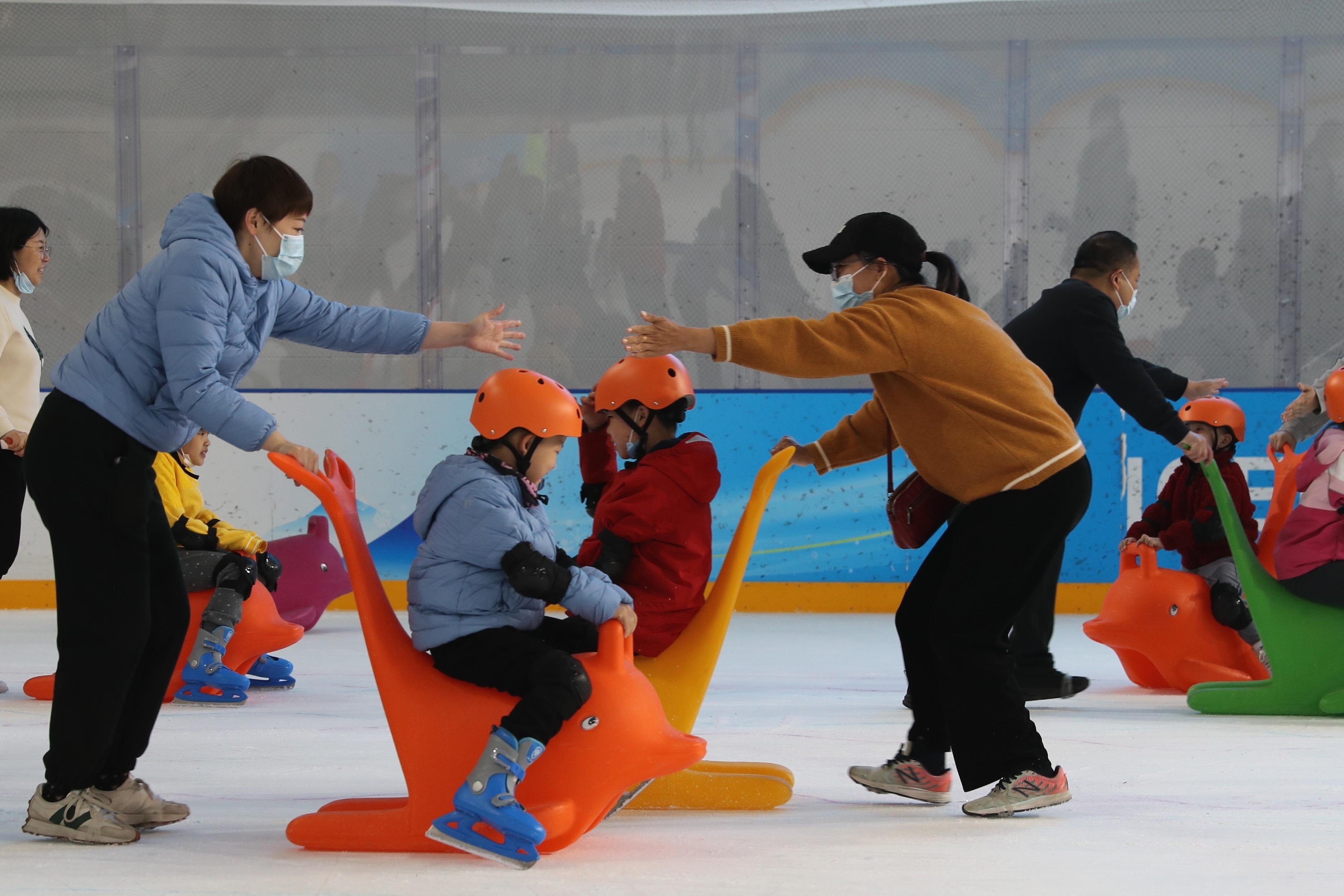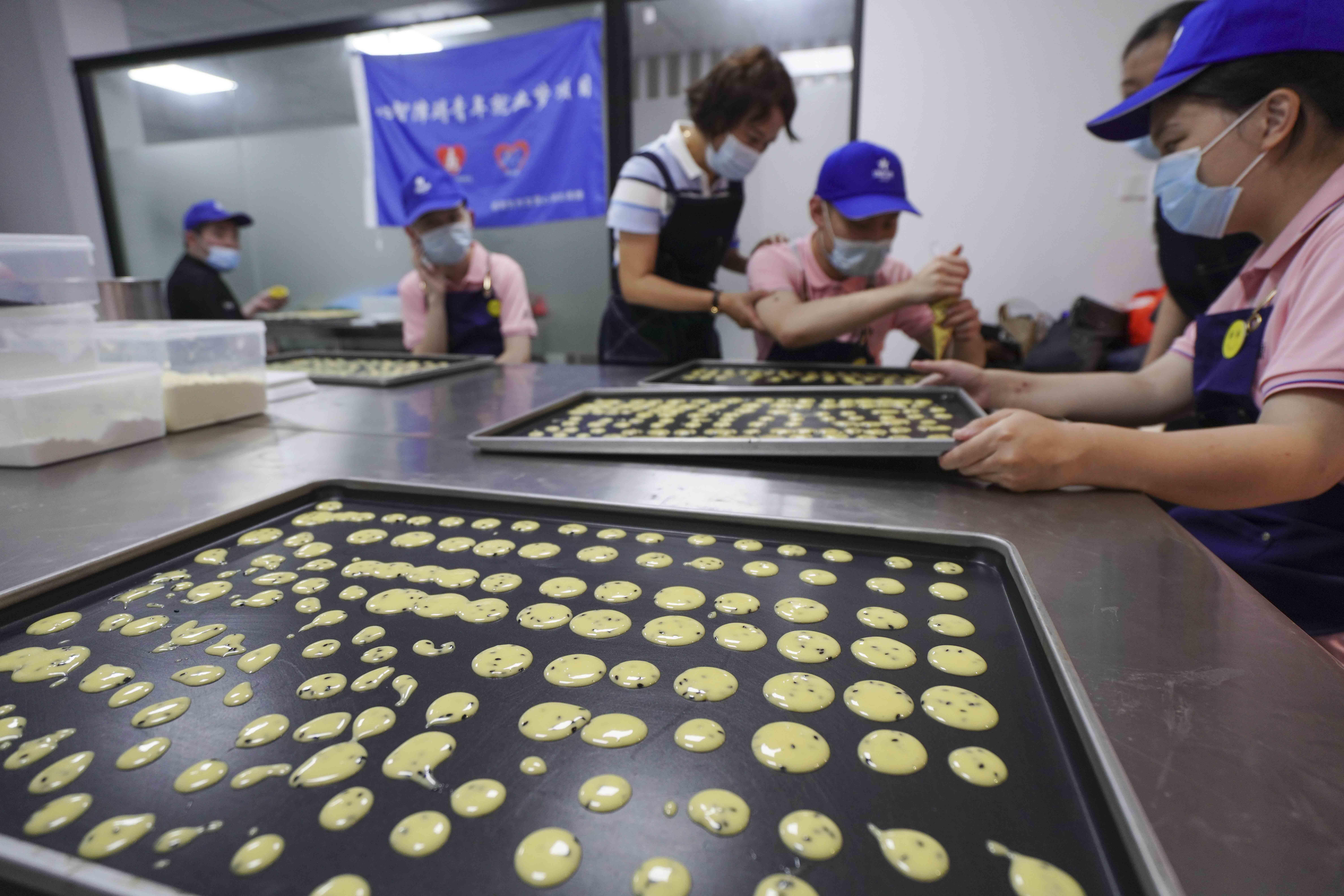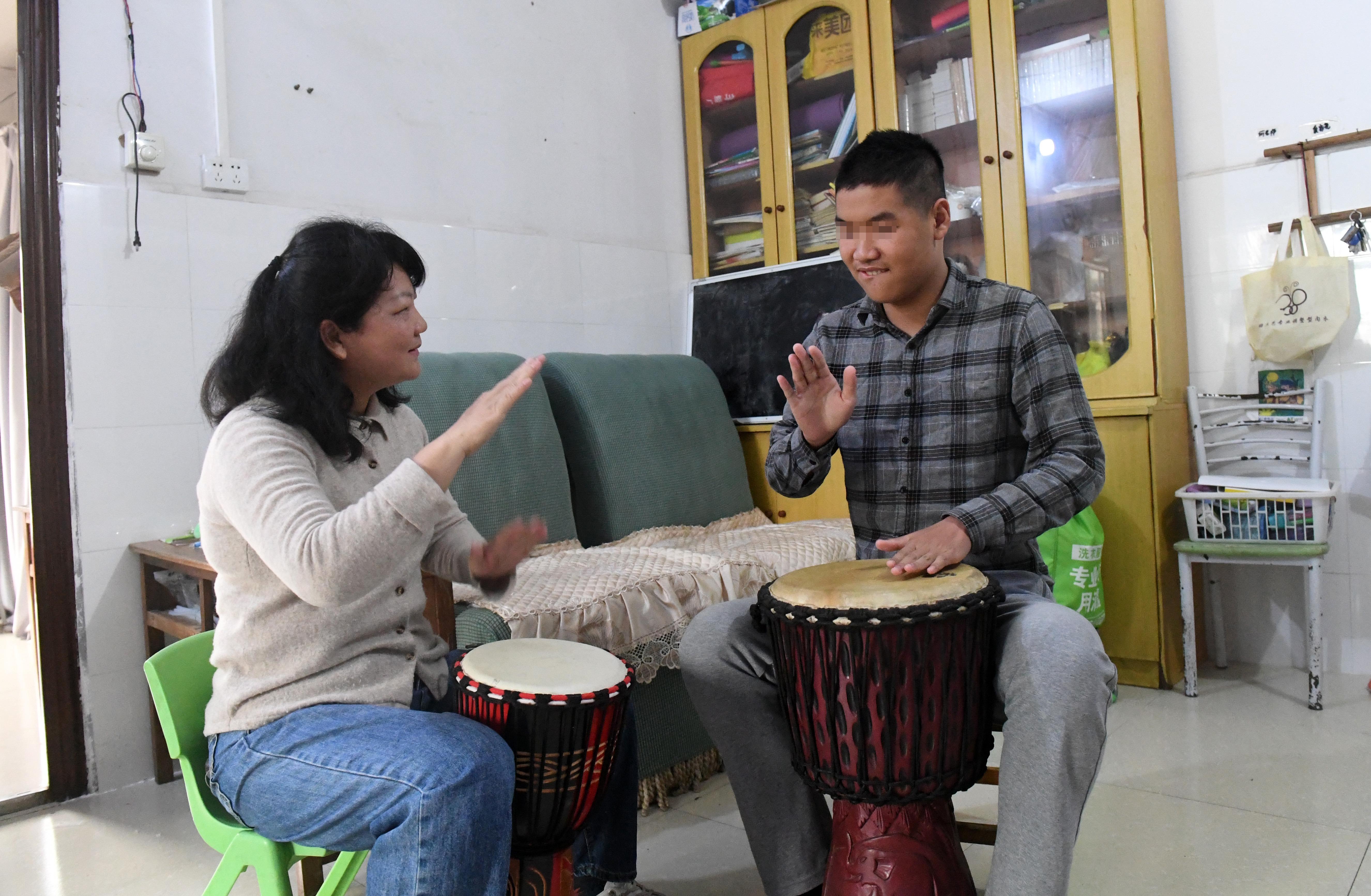State, community and family all integral to task of care, integration, experts say
 Children from Meicheng kindergarten in Luyang district of Hefei city, Anhui province, display the blue belts, a symbol for love and gratefulness, tied on their wrists to call for more care for autistic people on March 30. (ZHAO MING/FOR CHINA DAILY)
Children from Meicheng kindergarten in Luyang district of Hefei city, Anhui province, display the blue belts, a symbol for love and gratefulness, tied on their wrists to call for more care for autistic people on March 30. (ZHAO MING/FOR CHINA DAILY)
Autistic children tend to receive much attention and assistance from society, but the families behind them are forced to carry their own burdens.
Xiao Yun, mother of a 12-year-old daughter with autism and a 10-year-old son in Zhengzhou, capital of central China's Henan province, said she felt like she was falling from a deep cliff when the doctor told her that her daughter had autism. At that time, her daughter, named Bingbing, was 2 and her son was a newborn.
I felt like they could not understand me. We had nothing in common and I was also afraid someone would go gossiping.
Xiao Yun, mother of an autistic child
Countless trivial things in life made her feel helpless. Bingbing was unable to function in many aspects and often lost control of her temper.
The woman's main source of pain, however, was the fact that her daughter was incapable of communicating with her — she gave no hugs and never called her mom, which broke the woman's heart.
In the course of taking care of Bingbing, Xiao Yun quit her job and lost contact with her friends.
"I felt like they could not understand me. We had nothing in common and I was also afraid someone would go gossiping," the mother recalled.
For a long time, she felt lonely but was unable to find an outlet to let the negative emotions go.
Two years later, when Bingbing was four, Xiao Yun joined a parent support group for children with special needs in Zhengzhou. She met many parents, mostly mothers, who shared the same experiences as her and became friends with some of them.
Xiao Yun often joined activities organized by the group, such as reading books, making paper crafts or walking in the park. Those were rare, relaxing moments in her life.
 An activity calling for more care and love for autistic people is held at the National Aquatics Center to celebrate World Autism Awareness Day in Beijing on April 2. (WANG ZHUANGFEI / CHINA DAILY)
An activity calling for more care and love for autistic people is held at the National Aquatics Center to celebrate World Autism Awareness Day in Beijing on April 2. (WANG ZHUANGFEI / CHINA DAILY)
After participating in the activities, Xiao Yun felt full of energy, and could again carry on her sometimes difficult life.
She also felt a special connection with other mothers from the group.
"Over the years, when we were under pressure, we would call each other to release the negative feelings. When I speak about my feelings with someone who can understand me, I feel better," she said.
Among all activities, Xiao Yun liked the book reading club the best. She remembered reading a book about nonviolent communication with other mothers. Through it, they learned how to manage their emotions, better communicate with children, and create a good family environment.
The mother found that Bingbing's emotions were closely affected by her mood. "When I am happy, she is happy," she said.
"Although Bingbing cannot communicate in words, she can feel my mood. When I am in a bad mood, Bingbing will be tense. But when I am in a good mood, Bingbing will be happy and relaxed. The change in her mood is obvious," she said.
When the mother receives support from the group and society, her autistic child feels it too. "Everything is better," she said.
Data from the China Association for the Mentally Disabled and Their Relatives and Friends showed that China has about 14 million people with autism. Millions of families are struggling with the disease.
Care, however, is still insufficient.
 Teachers train autistic teenagers how to bake at Lucheng Charity Center in Wenzhou, Zhejiang province, on May 30. (SU QIAOJIANG / FOR CHINA DAILY)
Teachers train autistic teenagers how to bake at Lucheng Charity Center in Wenzhou, Zhejiang province, on May 30. (SU QIAOJIANG / FOR CHINA DAILY)
According to the Blue Book on the Needs of Autistic Families in China released by the association, 95 percent of parents believe that professional counseling and policy information are urgently needed, and 79.1 percent said they have not received systematic, specialized training in rehabilitation education or other skills important in caring for autistic children.
The same document revealed that most families with autistic children are under economic pressure, and more than half have one person give up work to take care of children. Multiple stresses affect family stability. Parents are also marginalized by society.
A survey jointly conducted by the Shenzhen International Public Welfare Institute and Tencent Public Welfare Center showed that autistic people of different ages have various core needs. Family, school and society constitute the social support network of autistic people, with family at the core.
"Family is the smallest unit of social connection through which people receive support, and family members are lifelong companions and caregivers for people with autism," said Guo Xiamei, associate professor in psychology at Xiamen University in Fujian province. "That is why a community-based support system for families with autistic members is encouraged and valued."
To support autistic children with social education encourages them to get in touch with society, said Zhen Yuelai, a lecturer from the Beijing Information Science and Technology University, also an expert on social education for sufferers of autism.
"The social development of autistic people cannot be limited to rehabilitation or 'treatment' in the classroom or hospital," said Wen Hong, president of the China Association for the Mentally Disabled and Their Relatives and Friends.
"In particular, training to adapt to daily life and different social settings is needed, and community-based provision of necessary supportive services is required," she added.
"It is important to build a community to provide independent living and community acceptance for children as they are growing up, and also to provide support for adult autism sufferers after their parents have passed away," said Feng Tao from the association.
 A mother teaches her son who suffers from autism to play drum in Nanning city, Guangxi Zhuang autonomous region on March 31. (PHOTO / XINHUA)
A mother teaches her son who suffers from autism to play drum in Nanning city, Guangxi Zhuang autonomous region on March 31. (PHOTO / XINHUA)
Zhen echoed this concern: "When the parents of autistic people get older, who should they entrust their children to at the end of their lives?"
Autistic children receive much attention from society. But when those children become adults, less social assistance is provided. Families of people with autism again must shoulder the full burden of caring for them.
"People with autistic spectrum disorders require life-long assistance and training. The help should not be reduced at the age of 18," Guo said.
Xiao Yang, researcher at the Women's Research Institute of the All-China Women's Federation, said that at present, care services for adults with autism are hampered by lagging understanding of disability, unbalanced development of care services, lack of training in care services, insufficient allocation of resources, and rigid, single-mode care services.
She said that taking into account people with autism disorders is an integral part of improving the social welfare system for the disabled.
Xiao suggested prioritizing the development of care services for people with severe autistic symptoms, supporting the development of private nursing service institutions, training more professionals and promoting community-based support networks for adults with autism.
It is also necessary for society to accept different kinds of people, including ones with autism, said He Xin, an associate professor at the School of Sociology and Population at Renmin University of China.
"We need to work together to build a more inclusive and integrated society," she said.


